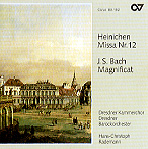Lest you may someday make the mistake of underestimating the compositional skill and artistic achievement of 18th-century Dresden court composer Johann David Heinichen, you may want to listen to this recording of his D major Mass No. 12. Besides the showers of ravishing music, which often come in relatively short, less-than-two-minute downpours, you’ll enjoy colorful orchestrations, sudden and surprising shifts of mood and abrupt endings, and an overall experience that shines a welcome light on yet another corner of Baroque repertoire long hidden in the shadow of Bach. An earlier recording of another Heinichen mass by these same forces also received ClassicsToday.com’s highest rating (type Q3768 in Search Reviews), and if you read that review, you’ll find descriptions similar to the ones expressed here. That’s because Heinichen wasn’t just a one-hit wonder, but rather produced many large works of an exceptionally high standard, even though some critics will find his ideas, brilliant as they are, often left underdeveloped. That is, Heinichen often begins what sounds like a major fugue or presents a melody rich in promise and then just as quickly ends it.
My take on this is that in these masses he was not thinking of posterity or of creating grand masterpieces but rather kept things short simply in consideration of his “audience”–and yet he didn’t cheat them at all in terms of stirring, lively tunes and excitingly rhythmic choral and orchestral sections. Just listen to the terrific horn riffs in the opening of the Gloria and during the Handelian alto solo “Quoniam tu solus Sanctus” (including what sounds like an ever-so-brief quote from the Water Music!). Delightful melodic figures spring from both chorus and orchestra in the opening of the Credo, and quickly disappear in the section’s sudden, quiet ending; similar quick-but-mighty thrills await at the Credo’s final fugal “Et vitam” passage and in the lightning-fast runs in the Osanna–only 50 seconds, total–that rival any of Handel’s similar effects. And this chorus takes to the challenge without a stumble.
The choruses are interspersed with delicate, beautifully-sculpted short solo arias that condense a lot of textual meaning into a small space (a charming little soprano solo takes care of the Benedictus), invariably complemented with perfectly balanced chamber accompaniment. The concluding sections–two Agnus Dei movements and the Dona nobis pacem–leave us with the sound of beautiful melodies in our heads and with a warm feeling in our hearts. Was that a 34-minute-long mass we just heard? It goes by so quickly and so gracefully and easily that, well, that’s what CD player repeat buttons are for.
Oh yes, the other work on the disc is Bach’s inimitable masterpiece of a Magnificat, and these performers–chorus, orchestra, and soloists all–present the piece as if born to it. Conductor Hans-Christoph Rademann leads with authority, emphasizing crisp rhythms, beautiful sonorities, vibrant, electric energy, purposeful tempos, and nice expressive gestures–little dynamic gradations, extra-precise articulations (as in the ending of the word “Magnificat”)–that give impetus, clarity, and emotional radiance to the performance. Especially fine are the bass solo “Quia fecit”, the alto/tenor “Et misericordia”, and the “Suscepit Israel trio. No, the soprano soloist’s edgy tone in “Et exsultavit” will not engender uniform praise from all listeners, and some, like me, may wish for a slightly faster tempo in the “Quia respexit”–and of course, the “Omnes generationes” doesn’t have nearly the driving force of Gardiner’s. But this is the kind of work that probably never will allow an “ideal” performance–there’s always something you’d like to fix. But not all listeners are that fussy, thank heaven–and if you get this recording, chances are excellent that you’ll be very happy with what you hear. In keeping with what seems like Carus’ standard practice, texts are in Latin and German only, and there is (annoyingly) no basic track listing in the liner booklet–only on the back of the outer package.
































